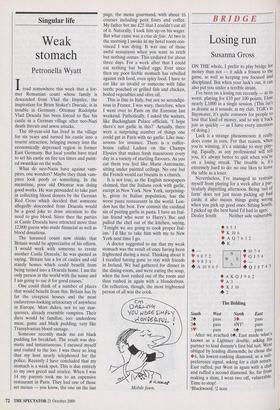BRIDGE
Losing run
Susanna Gross
ON THE whole, I prefer to play bridge for money than not — it adds a frisson to the game, as well as keeping you focused and disciplined. But when your luck's out, it can also put you under a terrible strain. I've been on a losing run recently — at its worst, playing for £10 per 100 points, I lost nearly £,1000 in a single session. (This isn't as drastic as it sounds; at my club, TGR's in Bayswater, it's quite common for people to lose that kind of money, and to win it back just as quickly — as I have every intention of doing.) Luck is a strange phenomenon: it really does come in runs. For that reason, when you're winning, it's a mistake to stop play- ing. Equally, as any professional will tell you, it's always better to quit when you're on a losing streak. The trouble is, it's extremely hard to do: no one likes to leave the table as a loser.
Nevertheless, I've managed to restrain myself from playing for a week after a par- ticularly dispiriting afternoon. Being 'out of form' does not just mean picking up bad cards; it also means things going wrong when you pick up good ones. Sitting South, I picked up the best hand I'd had in ages: Dealer South Neither side vulnerable
2 4 9 6
4
♦
5 8 5 3 K 10 6
• A Q 7 4K
6 3 2
4 10 7 4
♦ Q J 5 4
• — Q J 8 7
4 3 W
N S
E
4 —
✓ 9 8 7 • 9 8 5 + A 10 + AKQJ 9 6 2 ✓ A3
• K J 10 4 2
The Bidding
South West North East 24 pass 3* pass 34 pass 4NT1 pass 512 pass 64 pass , After we reached 64, East made what s known as a Lightner double, asking his partner to lead dummy's first bid suit. West obliged by leading diamonds; he chose the *4, his lowest-ranking diamond, as a suit- preference signal, asking for a club return. East ruffed, put West in again with a club and ruffed a second diamond. So, far from making a slam, I went two off, vulnerable. Time to stop!
'Blackwood; 22 aces

























































































 Previous page
Previous page